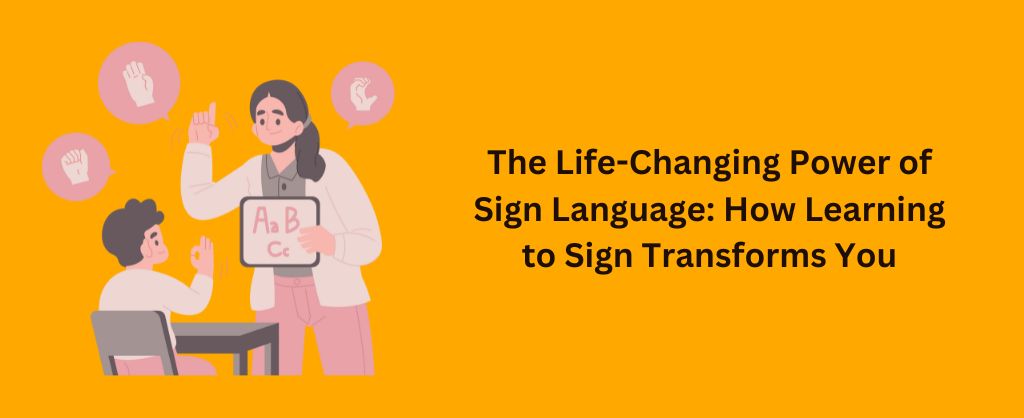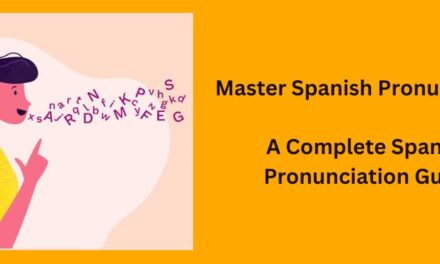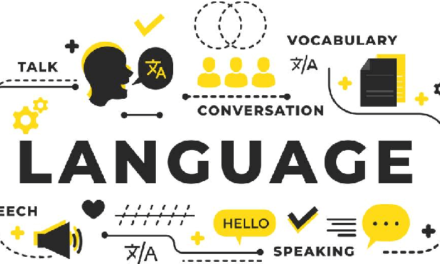The Life-Changing Benefits of Learning Sign Language

Have you ever thought about picking up sign language? I totally think you should go for it! Learning to sign has a whole bunch of advantages you might not realize at first.
Let’s explore the benefits that learning sign language can provide.
Learning sign language can be an incredibly rewarding and beneficial experience. Not only does it allow you to communicate with members of the Deaf community, it also provides many additional advantages that others may not realize.
Keep reading to learn about some of the best reasons you should add learning sign language to your bucket list!
Improved Communication Skills
One of the most obvious benefits is the ability to communicate with Deaf individuals who use sign language as their primary mode of communication.
But sign language can also help improve communication skills for hearing people as well. Here’s why:
- It requires focus and visual attention – you have to pay close attention to facial expressions and body language. This builds skills like eye contact.
- It’s a different mode of communication – by learning a visual/spatial language like sign language, it exercises your brain in new ways.
- It helps you gain confidence – having another tool for communication can make you feel more confident interacting with all types of people.
- It improves nonverbal communication – sign language utilizes facial expressions and body language as an important part of the language. This can help you get better at expressing yourself nonverbally.
Enhanced Memory and Cognitive Benefits
Research has shown that learning a second language like sign language can provide cognitive benefits, including improved memory.
Here are some of the ways that sign language boosts brain power:
- Improves visual-spatial processing – sign language relies heavily on visual-spatial processing as you interpret 3D hand signs and facial expressions.
- Works out your working memory – to follow conversations, you need to actively hold signs in your short term memory while decoding meaning.
- Helps strengthen neural connections – learning languages creates new neural pathways in the brain, keeping your brain plastic.
- Enhances attention and concentration – the visual-gestural nature of sign language requires strong focus and attention.
- Improves memorization skills – sign language provides a unique way to encode information visually for improved memorization.
Increased Employment Opportunities
Knowing sign language makes you an asset in many workplaces, opening up more job opportunities.
Some examples include:
- Healthcare – sign language interpreters are vital for ensuring Deaf patients receive equal care. Knowing sign language helps nurses, doctors, technicians and other staff provide better care.
- Education – sign language interpreters help Deaf students thrive in school environments. Teachers who know sign language can more easily accommodate Deaf students.
- Customer service – companies want to serve all customers, including Deaf ones. Knowing sign language allows you to bridge communication gaps.
- Government and legal professions – sign language interpreters are crucial for ensuring Deaf individuals can participate fully in civic life. Knowledge of sign language is a plus for many public-facing roles.
- Performance arts – sign language is used in some theatrical productions and music performances to make them accessible to Deaf audiences. Knowledge of sign language can help entertainers connect.
- Ministry – religious leaders who know sign language can serve Deaf congregants and make services more inclusive.
Ability to Communicate with Babies
Here’s another cool thing you may not have thought of – you can use basic sign language to communicate with infants before they can talk!
Using simple baby signs, you can understand what your little one needs when they’re still pre-verbal. This reduces tantrums and builds an awesome bond. It may even boost early language development!
Some benefits of using baby sign language include:
- Reduces frustration and tantrums – babies can communicate basic needs like “more” and “eat”.
- Jumpstarts verbal skills – research shows baby sign language may help stimulate early speech development.
- Strengthens parent-child bond – parents feel more connected to babies when they can understand their needs.
- Provides mental stimulation – sign language helps develop visual-spatial processing skills early.
- Gives babies a sense of accomplishment – signing gives pre-verbal babies a satisfying way to get their message across.
Opportunity to Learn a New Culture
Sign languages develop within Deaf communities and reflect the unique cultural aspects of those communities. By learning sign language, you’ll gain insight into the rich cultural heritage of the Deaf community, including:
- Customs – Deaf culture has its own etiquette norms, traditions, and rules for getting someone’s attention, interrupting conversations politely, and more.
- History – Deaf history spans centuries and includes the development of sign languages and Deaf education.
- Values – concepts like Deaf pride, identity, and self-determination are central parts of Deaf culture.
- Literature and arts – Deaf poets, playwrights, and artists create works that capture the essence of Deaf perspectives and worldviews.
Immersing yourself in Deaf culture by learning sign language provides a chance to celebrate the human experiences that unite us all, while appreciating a unique cultural legacy.
Reduced Risk of Dementia
Okay, this one needs more research. But some studies suggest knowing multiple languages including sign language could help delay cognitive decline later in life.
Since sign language works your brain differently than spoken languages, some experts think learning it provides extra mental exercise that adds to your cognitive reserves. More reserves may help preserve memory and thinking skills as you age.
Again, more studies are needed in this area. But it seems like a pretty sweet potential brain benefit!
A Fun and Engaging Hobby
In a world where lives are increasingly busy and overscheduled, learning sign language provides a meaningful hobby that is also wonderfully expressive and creative. Unlike some other academic pursuits, learning a language is active, visual, and social.
Some of the enjoyable aspects of learning sign language include:
- Expressiveness – sign language allows you to communicate with big facial expressions and dramatic gestures.
- Social connection – you’ll likely practice sign language together with classmates and Deaf friends. Language partners make it fun.
- Mental challenge – memorizing signs and grammar rules exercises your brain. It feels rewarding when concepts click.
- Creativity – as you advance, you can create artistic interpretations and styling of your signing.
- Real-world applicability – you get to use your hobby right away connecting with people.
- Sense of accomplishment – achieving conversational fluency provides a great sense of personal pride.
Enhanced Travel Experiences
If you love to travel, even basic sign language skills can really enrich your adventures abroad.
Knowing some signs allows you to overcome language barriers and connect with Deaf locals while traveling internationally. You’ll gain a deeper insight into the region’s Deaf culture too.
Sign language makes it easier to navigate new places, make friends, and get off the beaten tourist track by participating in Deaf events. It allows you to communicate with more people, appreciating diversity and making memories.
Benefits of learning sign language for Children
Teaching babies and children sign language early on provides tons of amazing benefits, like:
- Earlier communication before speech develops
- Bigger spoken vocabularies down the road
- Less frustration for pre-verbal kids
- Enhanced emotional expression
- Better focus and academics in school
- Improved visual spatial skills
- An alternative to too much screen time!
Child development experts highly recommend giving babies and toddlers a sign language head start.
Bringing People Together
At its heart, sign language is about communicating and fostering human connections across perceived divides. When you take the time to learn sign language, you help cultivate more inclusion, understanding, patience, and acceptance between people and communities.
Some of the bridge-building benefits of sign language include:
- Building relationships – sign language allows you to communicate directly with Deaf friends and colleagues.
- Promoting inclusion – knowing sign language helps create more accessibility and welcoming environments for Deaf individuals.
- Advancing equality – sign language skills can help reduce marginalization of Deaf people.
- Creating allies – taking the time to learn sign language demonstrates your support of the Deaf community.
- Developing patience – sign language requires focus and presence. This nurtures patience.
- Facilitating understanding – gaining insights into Deaf perspectives builds more compassion.
- Appreciating diversity – exposure to Deaf culture enhances openness and respect for differences.
- Strengthening communities – bringing people together through a common language builds bonds.
At a time when society often feels divided, the simple act of learning sign language can remind us how much unites us when we make connections with openness, patience and understanding.
Conclusion
Learning sign language provides a wide array of benefits ranging from enhanced communication skills to cognitive health advantages to career development to cultural appreciation. While it takes time and commitment like any new language, it is an incredibly enriching endeavor.
Sign language allows you to communicate with Deaf community members, babies, foreign travelers and even enhance your own self-expression and mental sharpness. It is a hobby that is interactive, visual, and opens your mind and heart.
More public awareness about the many perks that sign languages offer could inspire larger numbers of people to explore studying these unique visual languages.
Our world could become a bit more inclusive, a bit more patient, a bit more curious and a whole lot fuller of rich new connections.
Any step you can take on your own sign language journey will not just benefit you, but also help strengthen communities and bring us all closer together.












